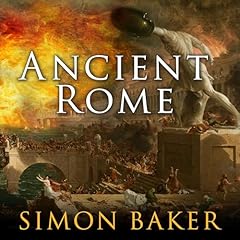
Fatal Discord
Erasmus, Luther, and the Fight for the Western Mind
No se pudo agregar al carrito
Add to Cart failed.
Error al Agregar a Lista de Deseos.
Error al eliminar de la lista de deseos.
Error al añadir a tu biblioteca
Error al seguir el podcast
Error al dejar de seguir el podcast
 Exclusivo para miembros Prime: ¿Nuevo en Audible? Obtén 2 audiolibros gratis con tu prueba.
Exclusivo para miembros Prime: ¿Nuevo en Audible? Obtén 2 audiolibros gratis con tu prueba.Compra ahora por $7.99
-
Narrado por:
-
Tom Parks
-
De:
-
Michael Massing
A New York Times Notable Book
A deeply textured dual biography and fascinating intellectual history that examines two of the greatest minds of European history—Desiderius Erasmus and Martin Luther—whose heated rivalry gave rise to two enduring, fundamental, and often colliding traditions of philosophical and religious thought.
“A masterly work. Massing manages to juggle the complicated biographies and life work of both Erasmus and Luther while giving the reader a well-written, comprehensive background of pre-Reformation theology.”— Publishers Weekly (starred review)
Erasmus of Rotterdam was the leading figure of the Northern Renaissance. At a time when Leonardo, Michelangelo, and Raphael were revolutionizing Western art and culture, Erasmus was helping to transform Europe’s intellectual and religious life, developing a new design for living for a continent rebelling against the hierarchical constraints of the Roman Church. When in 1516 he came out with a revised edition of the New Testament based on the original Greek, he was hailed as the prophet of a new enlightened age. Today, however, Erasmus is largely forgotten, and the reason can be summed up in two words: Martin Luther. As a young friar in remote Wittenberg, Luther was initially a great admirer of Erasmus and his critique of the Catholic Church, but while Erasmus sought to reform that institution from within, Luther wanted a more radical transformation. Eventually, the differences between them flared into a bitter rivalry, with each trying to win over Europe to his vision.
In Fatal Discord, Michael Massing seeks to restore Erasmus to his proper place in the Western tradition. The conflict between him and Luther, he argues, forms a fault line in Western thinking—the moment when two enduring schools of thought, Christian humanism and evangelical Christianity, took shape. A seasoned journalist who has reported from many countries, Massing here travels back to the early sixteenth century to recover a long-neglected chapter of Western intellectual life, in which the introduction of new ways of reading the Bible set loose social and cultural forces that helped shatter the millennial unity of Christendom and whose echoes can still be heard today. Massing concludes that Europe has adopted a form of Erasmian humanism while America has been shaped by Luther-inspired individualism.
Los oyentes también disfrutaron:




















Las personas que vieron esto también vieron:


















I would’ve preferred the Reader’s Digest version, but the last two chapters are worth their weight in gold!
The American Protestant divide
Se ha producido un error. Vuelve a intentarlo dentro de unos minutos.
Great!
Se ha producido un error. Vuelve a intentarlo dentro de unos minutos.
Fatal Discord takes one back to the origin of Christianity and the bible, and the schism that rent it in the 16th century.
Sadly, the narrator cannot properly pronounce the many European places and words, and when he refers to
'thesis' it sounds like feces.
Someone familiar with European languages and their pronunciations would have been a better choice than
Tom Parks who has a very American accent with no ability to navigate un English words
Utterly fascinating
Se ha producido un error. Vuelve a intentarlo dentro de unos minutos.
Printing and Printers: The Reformation Letters, Essays and Bibles
Se ha producido un error. Vuelve a intentarlo dentro de unos minutos.
sensative portrait of convictions and struggles of both.
 Accurate on their stories and impact on the modern
World. All book cheracters are sympathetically put into
Their historical context, This is a gteat blend of storytelling, Personalities and disputes that put
Them on history’s central stage. I thoight I knew
This story, but after this book my insights doubled.
best political & religious history of the west I’ve read
Se ha producido un error. Vuelve a intentarlo dentro de unos minutos.


